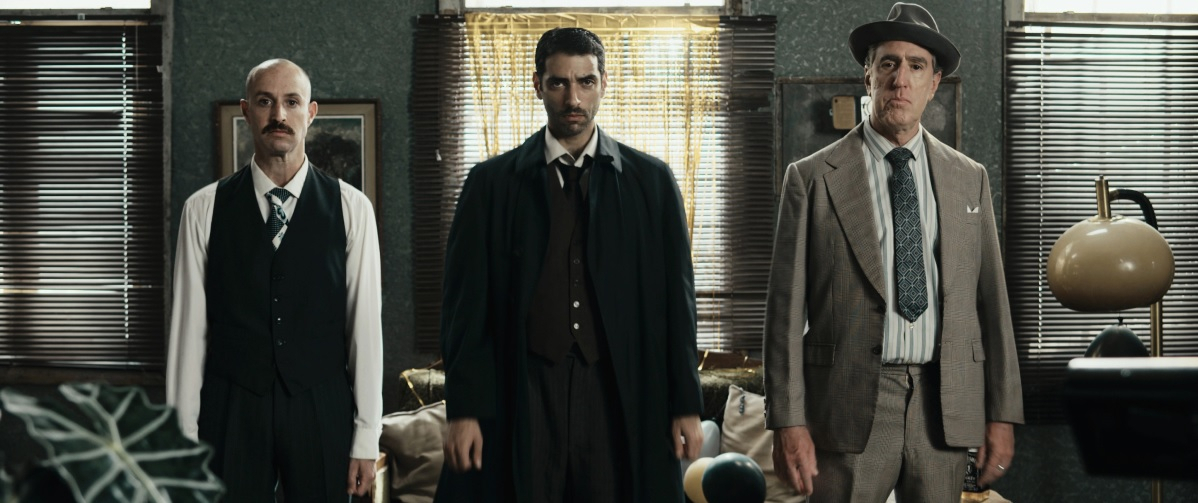 |
Director Amit Ulman of “The City” speaks in an interview with The Korea Herald in Jecheon, North Chungcheong Province, Sunday. (JIMFF) |
JECHEON, North Chungcheong Province – In Amit Ulman’s “The City,” a cynical detective named Joe is visited by mysterious nightclub singer Sarah on a stormy night. Following her request to help investigate her sister’s disappearance, Joe navigates complicated and suspicious circumstances with gangs, killers and corrupt police -- as well as Sarah.
While the 81-minute movie sticks to a typical film noir formula popular in the 1940s and '50s, a stylish crime flick that focuses on the cynical attitudes and motivations of antihero detectives and a femme fatale, “The City” stands out for filling all of its lines with explosive rap numbers.
“Every word in this movie is on the beat. (I wanted to portray that) characters act and also react like rappers, like with good punchlines,” Ulman told The Korea Herald in an interview at the Jecheon International Music Film Festival in North Chungcheong Province on Sunday.
While the characters in a typical crime flick would exchange lines in a refined tone and serious manner, detective Joe and his assistant Jack in “The City” talk to each other as if in a rap battle. With a soulful piano melody in the background, the two chat in rhythmical sentences that rhyme in Hebrew.
Ulman said “The City” began as a rap song written with his friends from a high school rap crew.
“It started as a rap song -- detective song -- and I’d always wanted to make a movie out of this. It took a long time, about 16 years, since I first wrote the very first scene at 22,” Ulman said.
The 39-year-old director, who is an Israeli actor, playwright, rapper and singer, first created the stage drama “The City” out of that detective rap song. In 2012, he won Golden Porcupine Awards in Israel for directing and writing the play. It also won for music and the outstanding ensemble.
Making into the movie, Ulman said, he was able to add more musical elements, like hip-hop and rap.
“As you can see in the movie, it’s not just the protagonists who sing their lines and speak in rap numbers. You see how the audience in the background, when Sarah fights with Joe in the nightclub, react to the two, do the hand gestures and even sing along, showing how they are captivated by the two. I think that is also part of the hip-hop culture,” he explained.
Though “The City” became well-known during its theatrical run of more than a decade, Ulman said funding for this minor genre movie was difficult. The Israeli government’s scarce funding for filmmaking also motivated Ulman to launch online crowdfunding.
“The movie didn’t follow the usual way of funding. I tried a lot to get the money from all kinds of places. That’s how we started shooting. With this one-month-long campaign, we were able to gather money to produce the movie. But we also had a big advantage, it was a play before the movie, and we had a lot of fans who wanted to support us and also want to watch the movie version,” Ulmand said.
“Film noirs are originally low-budget movies. The fact that there are a lot of shadows and dark scenes is actually because people don’t have a lot of money (to buy and set up the lights). But I think that naturally established the mood of the film,” he added.
“The City” is competing in the 20th JIMFF’s international feature film section. The winner will be announced Tuesday at the closing ceremony.
 |
“The City” (JIMFF) |
 |
“The City” (JIMFF) |






![[Herald Interview] How Gopizza got big in India](http://res.heraldm.com/phpwas/restmb_idxmake.php?idx=644&simg=/content/image/2024/11/20/20241120050057_0.jpg)
